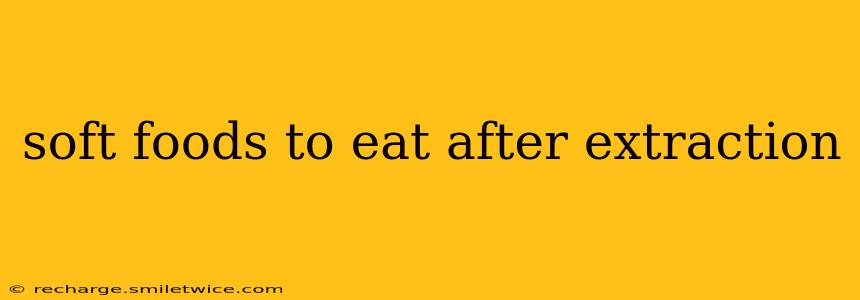Having a tooth extracted can be a bit uncomfortable, and knowing what to eat afterward is crucial for a speedy recovery. This guide focuses on soft foods that are gentle on your gums and promote healing after your extraction. We'll cover everything from the immediate post-extraction period to a gradual return to your normal diet.
What Can I Eat After a Tooth Extraction?
The first 24 hours post-extraction are the most critical. You need to avoid anything that could dislodge the blood clot forming in the extraction site. This means avoiding straws, spitting, and anything that requires vigorous chewing. Focus on nutrient-rich, easily digestible options.
Here are some excellent choices for the first 24 hours:
- Yogurt: Smooth, creamy yogurt provides protein and calcium, essential for healing. Opt for plain varieties and avoid those with chunks or seeds.
- Applesauce: This soft fruit puree is easy to swallow and provides fiber and vitamins.
- Mashed potatoes: A classic comfort food, mashed potatoes are soft, easy to chew, and packed with carbohydrates for energy.
- Oatmeal (smooth): Cook your oatmeal until completely smooth. Avoid any lumpy or crunchy bits.
- Smoothies: Blend fruits, vegetables, and yogurt for a nutrient-rich, easy-to-consume meal. Avoid anything with seeds or chunks.
What Soft Foods Can I Eat After 24 Hours?
After the initial 24-hour period, you can gradually introduce more textured foods. However, always chew on the opposite side of your mouth to avoid disturbing the healing extraction site.
Here are some good options:
- Scrambled eggs: Soft and protein-rich, scrambled eggs are a great way to get essential nutrients.
- Soft cooked pasta: Well-cooked pasta is relatively soft and easier to manage than other grains.
- Well-cooked vegetables: Soft cooked carrots, peas, or squash can be a good source of vitamins and fiber.
- Soups (broth-based): Avoid soups with chunky vegetables or noodles. Opt for broth-based soups with finely puréed vegetables or very soft noodles.
- Puddings: Creamy desserts like rice pudding or tapioca pudding can provide comfort and nutrients.
What Foods Should I Avoid After Tooth Extraction?
It's just as important to know what to avoid as what to eat. These foods can irritate the extraction site or interfere with healing:
- Anything crunchy: This includes chips, nuts, crackers, and even some cereals.
- Anything hard: Avoid hard candies, steak, and other tough foods.
- Foods that require excessive chewing: This includes whole grain breads, bagels, and chewy meats.
- Spicy foods: These can irritate the extraction site and cause pain.
- Acidic foods: Highly acidic foods, like citrus fruits and juices, can also be irritating.
How Long Should I Eat Soft Foods After Tooth Extraction?
The duration you need to eat soft foods depends on the complexity of your extraction and your individual healing process. Most people can transition back to a regular diet within a week or two. However, always listen to your body and avoid foods that cause pain or discomfort.
Can I Drink Through a Straw After a Tooth Extraction?
No, you should avoid drinking through a straw for at least the first 24 hours after a tooth extraction, and ideally longer, to prevent dislodging the blood clot. The suction created can disrupt the healing process.
What are some good recipes for soft foods after a tooth extraction?
Many simple recipes work well after an extraction. For example, you can easily create a nutrient-packed smoothie with frozen berries, banana, and yogurt. Or try a simple mashed potato recipe with a little butter and milk for a creamy comfort food. Simple pureed soups with soft vegetables are also excellent options.
This guide provides general information. Always follow your dentist's specific instructions regarding post-extraction care and diet. If you have any concerns or experience significant pain or complications, contact your dentist or oral surgeon immediately. Remember, proper nutrition is vital for a successful recovery, so pay attention to what your body tells you and choose foods that are both nutritious and easy to consume.
